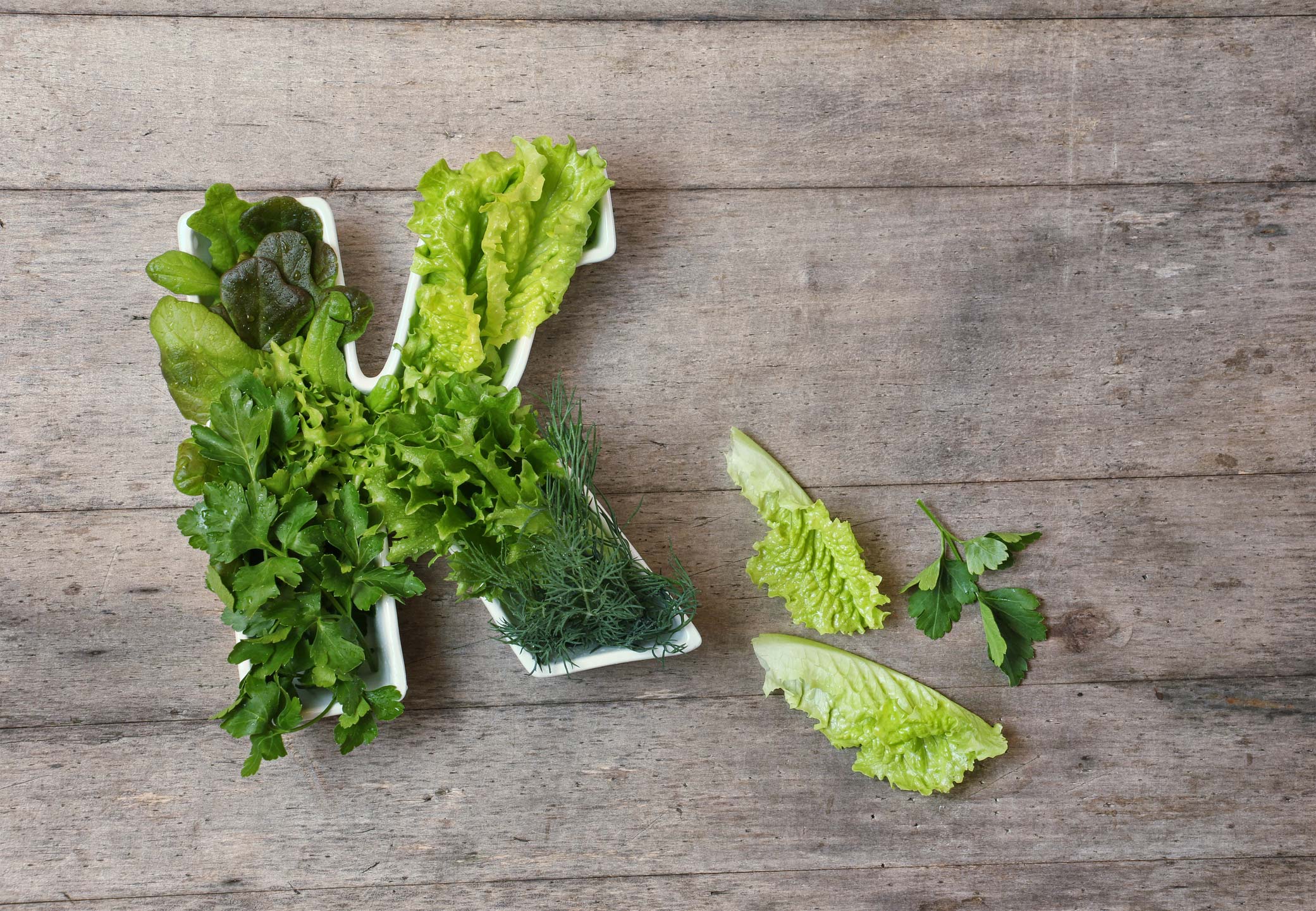In 1916, a chemist named Cornelia Kennedy left her job teaching “domestic science” to female students at the University of Minnesota for a research position at the University of Wisconsin, where her advisor was trying to figure out how to put together healthy animal feeds. In a paper on malnourished pigeons, Kennedy wrote of two chemicals, which she called “fat-soluble A and water-soluble B.” And just like that, we had a naming system for these newly-discovered nutrients, which came to be known as vitamins.
You’re undoubtedly familiar with the first five vitamins to be identified and named: A, B, C, D, and E. But then what happened? The next (and as it turned out, final) alphabetic vitamin is K, seemingly an insignificant afterthought. What happened to F, G, H, I, and J? Did scientists not know the alphabet song? Is vitamin K really not a big deal? This article covers what vitamin K is and does, how much you need, and the best places to get it in your diet.
What Is Vitamin K?
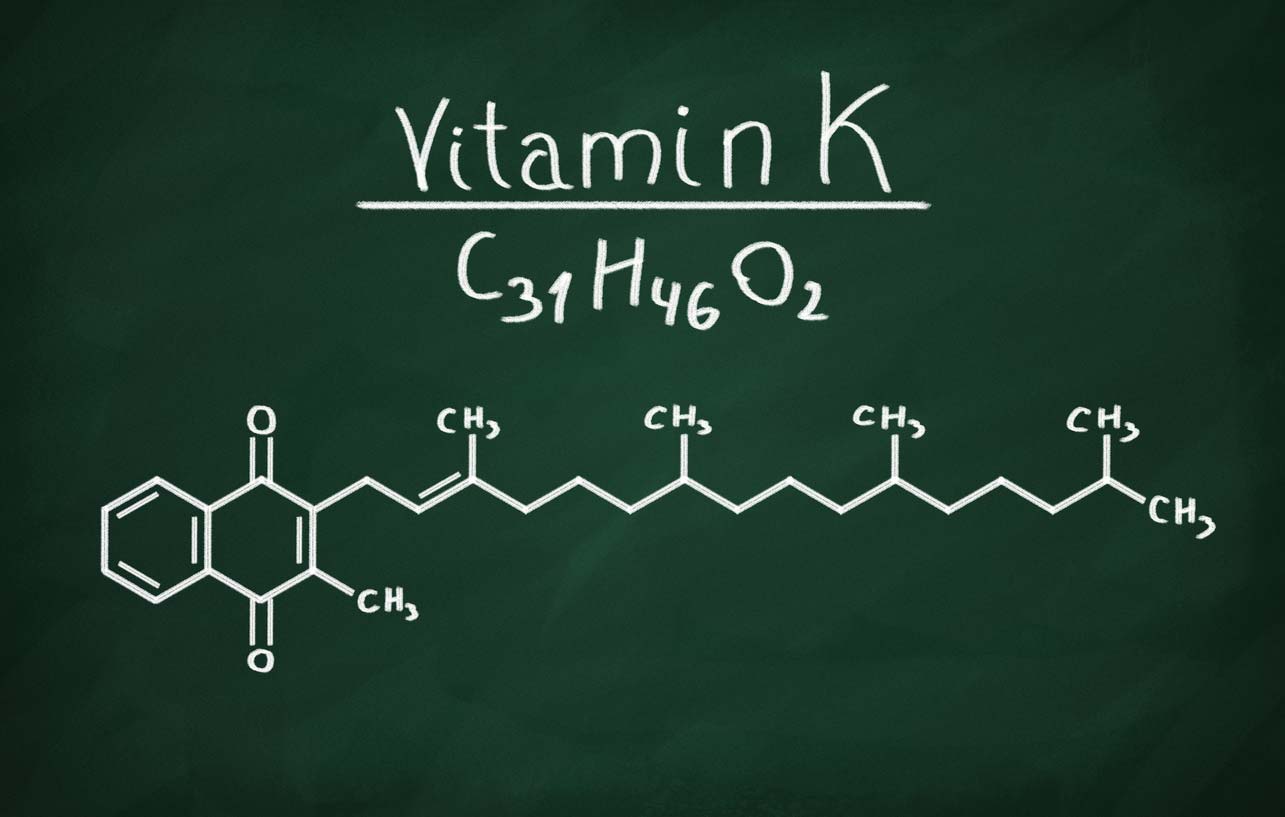
Vitamin K is a fat-soluble vitamin, which means it doesn’t dissolve in water. And excess (unused) amounts in your body are stored in your liver and fatty tissues. The absorption of vitamin K and other fat-soluble vitamins is best optimized when you consume them with some dietary fat.
Vitamin K is primarily involved in blood clotting, bone metabolism, and building proteins. It does its work in your liver and other tissues, including your brain, pancreas, and heart, as well as your skeletal system. Discovered in 1929, it was named vitamin K not as part of the alphabet scheme, but because the Danish researcher Henrik Dam found that it prevented chickens on a fat-free diet from bleeding out. He called it the “koagulation” vitamin (using the German spelling), or vitamin K.
And why not vitamin F, the next letter in line? It turns out that F, G, and H had been used until the chemical compounds they referred to were found not to be actual vitamins: F turned out to be the omega fatty acids; G was discovered to be part of the B vitamin group (B2, to be exact), and H was reclassified as biotin (or B7). So by the time Henrik Dam cured chicken bleed-out with hemp seeds, he was free to choose any letter he wanted.
Back to our story. Unlike the other fat-soluble vitamins, only very small amounts of vitamin K circulate in your blood at any given time. In fact, if you take a one-time, supplemental dose of vitamin K, your body will keep approximately 30-40% of it to use and store, and get rid of the rest. Your body has a limited amount of storage for vitamin K, so some of it is also recycled and reused multiple times.
Types of Vitamin K
While vitamin K sounds like one compound, there are actually two kinds. The first is vitamin K1, or phylloquinone, which is primarily found in cauliflower and leafy green veggies like spinach, kale, and cabbage. This is the main form of vitamin K found in the diet, yet some studies show most people absorb only about 10% of the vitamin K1 they ingest.
The other type is vitamin K2, or menaquinone, which is predominantly made by human and animal gut bacteria. Moderate amounts of K2 are found in certain fermented soy foods (especially natto, which is something of an acquired taste) and animal products like butter, beef liver, curdled cheese, and egg yolks. Interestingly, your gut bacteria appear to convert some vitamin K1 from your diet into K2, although the extent and efficiency of this conversion varies based on a number of factors.
Vitamin K Health Benefits

Both vitamin K1 and K2 are important for maintaining your overall health. Below are a few of the best-known health benefits of both forms of vitamin K.
Helps with Blood Coagulation
This may be the most well-known role of vitamin K in your body. Remember, vitamin K was named after the German word “koagulation.” Both vitamins K1 and K2 are involved in blood clotting, which is what keeps you from bleeding to death when you get a cut. Specifically, vitamin K is needed to manage proteins involved in the blood clotting process. If you don’t get enough vitamin K, you are more likely to experience hemorrhaging, or excessive bleeding, from a wound.
Good for Your Teeth and Bones
Inadequate intake of vitamin K has been linked to an increased risk for osteoporosis — a disease in which the bones become soft and porous — and bone fractures. Both vitamins K1 and K2 may also help with regulating calcium balance, which maintains skeletal strength. Seven trials have found that vitamin K2, specifically, reduced spinal fractures by 60%, hip fractures by 77%, and all non-spinal fractures by 81%. High doses of vitamin K2 have also been used to prevent further bone mineral loss and reduce the risk of fractures in patients with osteoporosis.
Vitamin K2-Specific Health Benefits
There are also some health benefits that seem to be tied only to vitamin K2.
May Reduce Your Risk of Heart Disease
Vitamin K2 may help prevent calcification that results from calcium buildup in your arteries. This accumulation is associated with atherosclerosis, a risk factor for heart disease. A 2009 study of 16,057 women found that for every 10 mcg of K2 that participants consumed each day, their heart disease risk was reduced by 9%.
May Support Brain Health
Vitamin K2 seems to be involved in processes that help protect your brain as you age. For instance, it plays a role in the production of compounds called sphingolipids, which are highly concentrated in the brain (and which sound like a lot of fun!). Changes in the metabolism of sphingolipids have been linked to neurodegenerative diseases like Alzheimer’s. Recent evidence also suggests that vitamin K2 may help protect against oxidative stress and inflammation, and may influence psychomotor behavior and brain function.
May Have Anticancer Benefits
A few studies have indicated that vitamin K2 may help reduce the recurrence of liver cancer and increase survival. And in a 2008 study published in the American Journal of Clinical Nutrition, researchers found that men with a high intake of vitamin K2 had a 63% lower risk for advanced prostate cancer.
How Much Vitamin K Do You Need?
Vitamin K is obviously doing some important work in your body, so how much should you be getting? Currently, most health authorities focus on K1 specifically, which is a shame because it seems that K2 is equally important for long-term health. According to the National Academy of Medicine, the daily requirement for vitamin K1 from foods is 90 micrograms (mcg) for women and 120 mcg for men. The World Health Organization and the Food and Agriculture Organization make recommendations that come out to an average of 55 mcg per day for women and 65 mcg per day for men.
While the recommended amounts vary, for most people getting enough vitamin K1 is not a problem. Most people who eat enough total calories get more than the recommended amount of it.
But K2 seems like it deserves more attention. And a few health authorities have even gone so far as to state a separate recommendation for it. Some scientists studying the effects of K2 suggest that its health benefits are best seen with a daily intake of between 10-40 mcg.
Vitamin K Deficiency

While deficiency of vitamin K1 is rare, it’s possible in the event of severe malnutrition. Those suffering from gastrointestinal disorders, or who have trouble absorbing fat, may be at risk of K1 deficiency. Other at-risk groups include babies who are breastfed by mothers who are vitamin K deficient, and adults who have taken coumarin anticoagulants (the best-known are the blood-thinning medications Coumadin and Warfarin). This is because these drugs can interfere with the synthesis of vitamin-K dependent coagulation proteins in the liver. Members of these groups may need their vitamin K status monitored. And they may require supplementation but should discuss the matter with a qualified healthcare provider first.
Vitamin K2 deficiency is trickier to diagnose, as the harm is mostly long-term. However, problems with blood clotting — like excessive bleeding from wounds — or unexplainable bruising under the skin may be signs of a potential K2 deficiency and should be examined further.
There may also be a link between vitamin K deficiency and osteoporosis. Studies have found that vitamin K2 prevents osteoporotic fractures and prevents vertebral fractures.
Vitamin K-Rich Foods
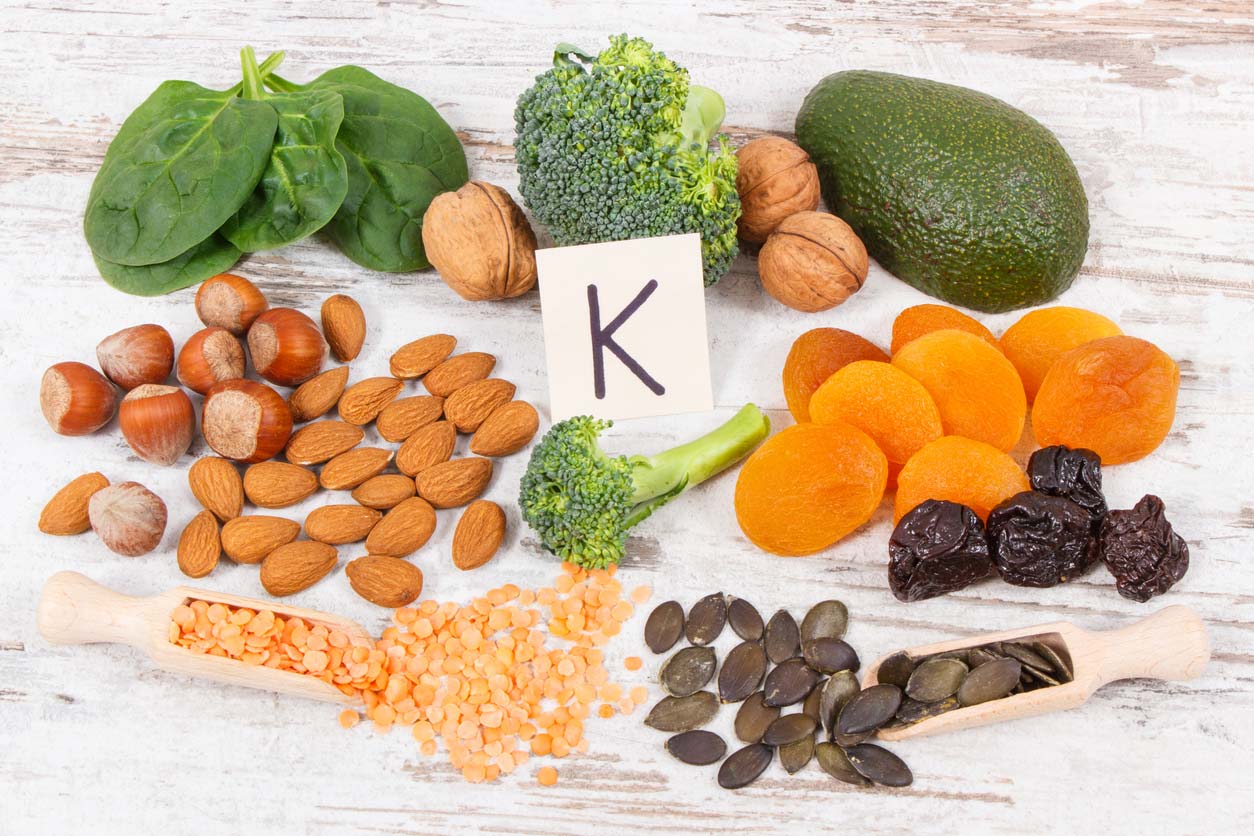
Some of the best vitamin K1-containing foods are:
- Leafy greens, such as spinach, mustard greens, and collard greens
- Cruciferous vegetables, such as Brussels sprouts, kale, broccoli, and cauliflower
- Asparagus
- Prunes
- Peas
- Parsley
- Scallions
And some of the most vitamin K2-rich foods are:
- Natto, which is by far the highest plant-based source of vitamin K2
- Tempeh
- Sauerkraut
- Kimchi
- Fermented pickles
- Animal products, like butter, egg yolks, organ meats, and high-fat dairy (more so if they are grass-fed or pasture-raised)
Note that while certain animal products are high sources of vitamin K2, they come with other health problems. Many are linked to a higher risk for obesity and chronic diseases like cancer, heart disease, type 2 diabetes, and neurodegenerative diseases like dementia. If you don’t want to go that route, you may want to include natto in your diet, and/or consider a supplement.
In case you’re not familiar with natto, it’s a Japanese dish, traditionally served for breakfast, consisting of soybeans fermented with natto bacillus. According to many Westerners, it’s an acquired taste. Some natto fans claim it tastes a bit like ripe brie cheese, and may even have overtones of bacon. You can find natto at specialty food stores and online, or you can be adventurous and make your own. A single teaspoon provides 50 mcg of vitamin K2. There is also some vitamin K2 in sauerkraut, tempeh, and other fermented foods, though amounts vary so it’s hard to know how much you’re getting.
3 Vitamin K-Rich Recipes
You’ll see in the recipes below that getting vitamin K1 and K2 on a plant-based diet can be delicious. Easy-to-prepare, tasty dishes like Spinach Artichoke Dip, Tempeh Italiano Farro and Spinach, and Cauliflower Steak with Peanut Sauce provide nutrients your body needs and loves to support heart, bone, and cognitive health.
1. Spinach Artichoke Dip
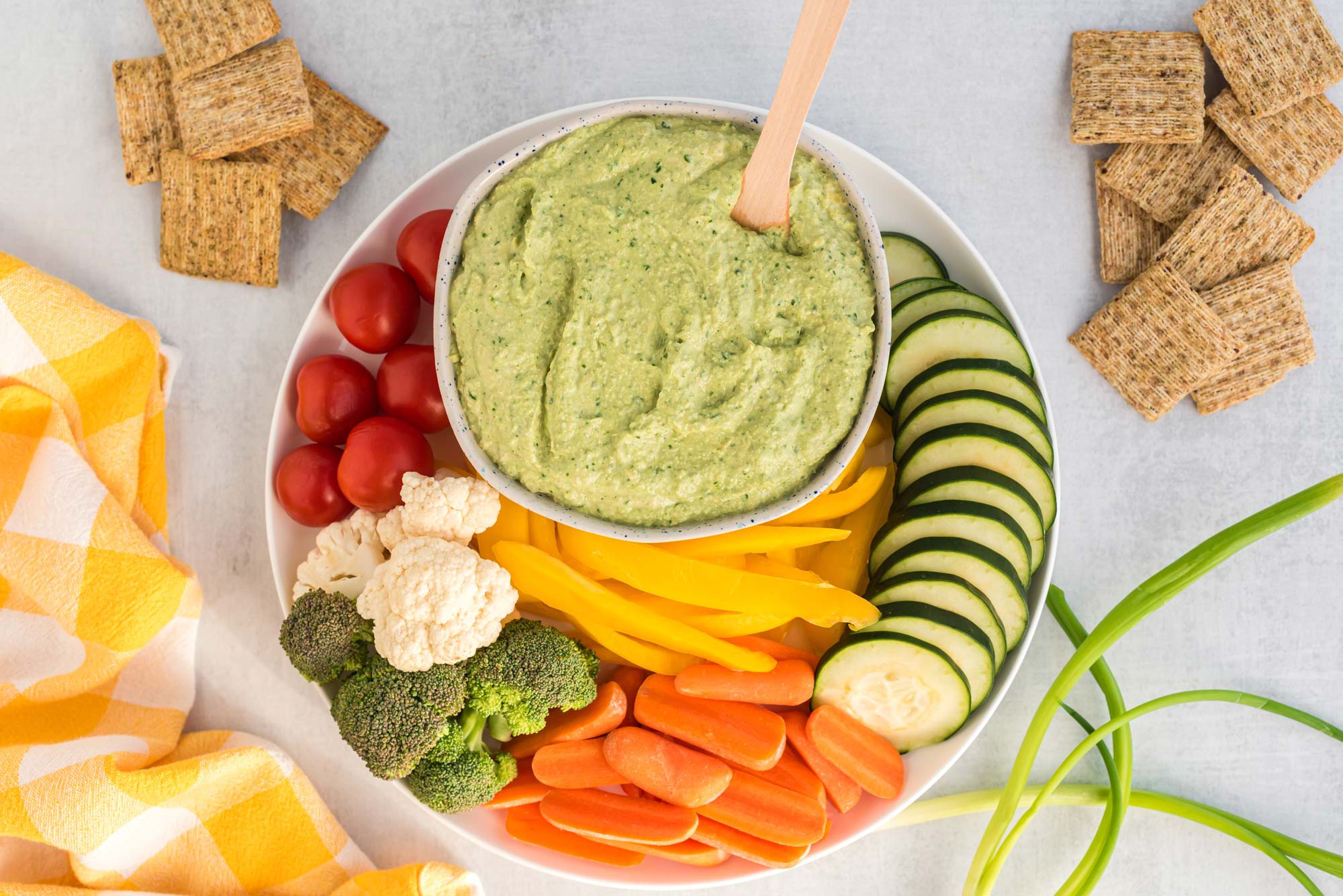
You can get an abundance of vitamin K1 in this tasty appetizer or snack. If you’re looking for a creamy, savory, and tasty treat that delivers a bundle of nutrients — then try out this mouth-watering Spinach Artichoke Dip!
2. Tempeh Italiano Farro and Spinach
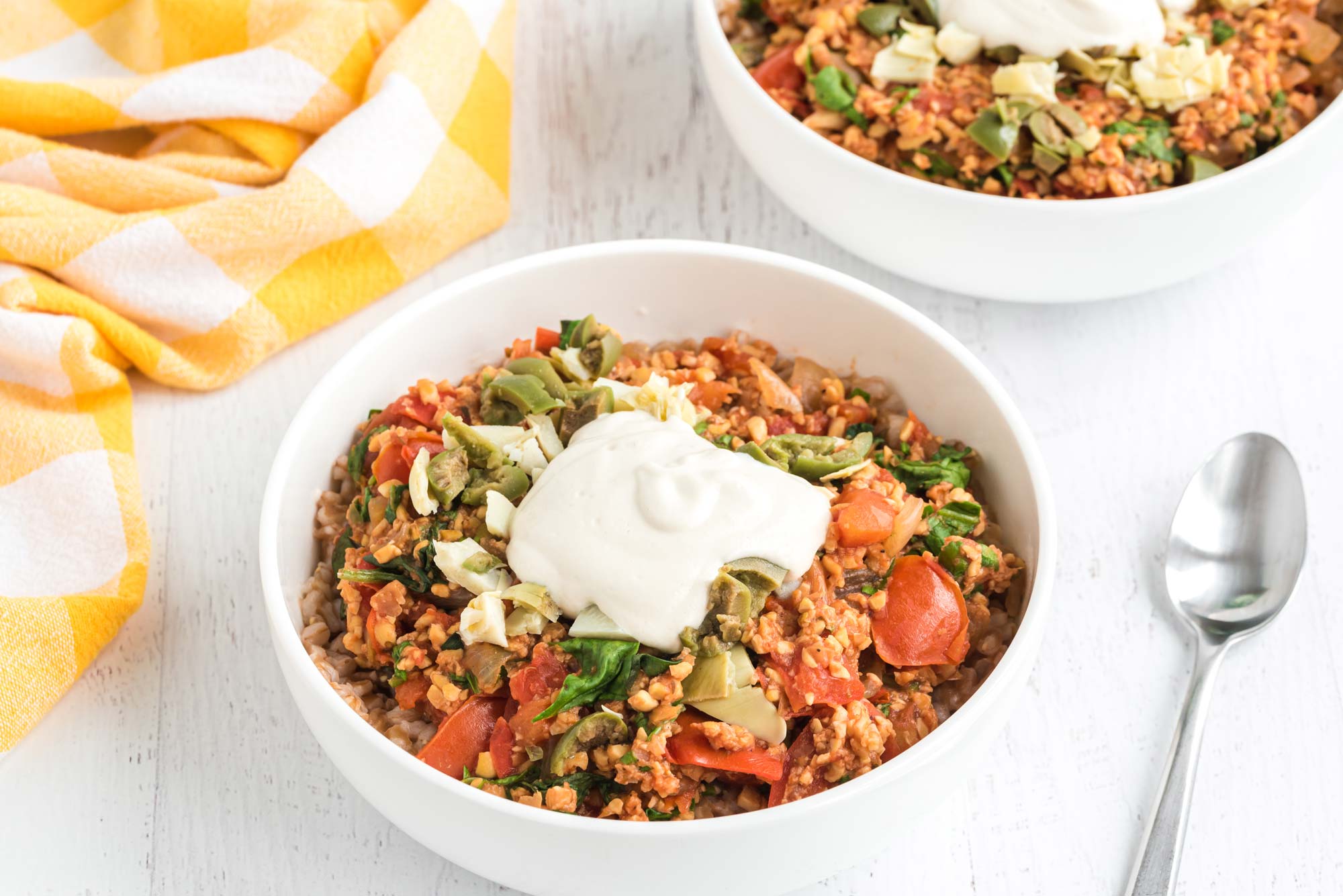
You’ll find both vitamins K1 and K2 in this nutrient-dense grain bowl. Also, farro is packed with fiber (five grams in just ¼ cup of the dry grain!), which helps to cultivate diverse, healthy bacteria in your gut. Not to mention, this delicious dish is sure to please the entire family!
3. Cauliflower Steak with Peanut Sauce

Cauliflower steaks provide satisfying texture and flavor while delivering so many essential nutrients, including vitamin K1 that the body needs to function properly and at its best. It also offers phytonutrients and fiber — both of which help to foster a healthy gut and the conversion of K1 into K2. And unless you’re allergic, don’t skip the peanut sauce! The healthy fat in the peanuts will help with the absorption of vitamin K (see the Chef’s Notes for peanut- and nut-free options). Bonus: Add a spoonful of kimchi or kraut on top for some dietary vitamin K2.
4. Natto Black Rice Bowl with Veggies

Ready to open your culinary mind (and kitchen!) to something new, adventurous and worldly? Meet natto! This Japanese staple hasn’t (yet) made its way to mainstream Western cuisine, but it deserves to. While you may not be super familiar with natto, what you probably do know well are soybeans. Natto is simply fermented soybeans. But during that fermentation process, something magical happens — vitamin K2 is created. The Natto Black Rice Bowl is your chance to experiment with this nutrient-packed food. We hope you love it!
Vitamin K Testing
Testing for vitamin K1 deficiency is not typically done routinely, except in the case of severe bleeding or hemorrhaging, which can be a symptom of severe deficiency. The primary lab test performed to evaluate for vitamin K1 deficiency is called prothrombin time (PT). This measures the time it takes for your body to form blood clots and stop active bleeding. If the result of the PT test is prolonged — meaning that blood clotting takes longer than it should — and is suspected to be a result of low vitamin K1, then vitamin K1 supplementation is typically prescribed.
While tests for Vitamin K1 are aimed at blood clotting and coagulation, tests aimed at K2 are focused on bone health markers. Testing for Vitamin K2 is more difficult because Vitamin K2 itself is challenging to measure. But labs can measure levels of osteocalcin, which is a protein found in bones and teeth that is activated by Vitamin K2. If you can measure the level of activation of this Vitamin K2-dependent protein, you get a rough idea of your Vitamin K2 status.
In the US, both LabCorp and Quest Diagnostics offer Osteocalcin tests.
Should You Take a Vitamin K Supplement?

Vitamin K1 is found widely in foods. If you are eating enough food — and especially if your diet includes a decent amount of leafy vegetables — you will almost certainly get more than you need. But vitamin K2 is a bit more tricky. Some people are able to convert vitamin K1 to vitamin K2. But not everyone has the ability to. And since the main sources of vitamin K2 in the modern diet are certain fermented soy products, and animal products (specifically high-fat dairy products from grass-fed cows, egg yolks, and organ meats), many people, and especially vegans, may want to consider a supplement.
A word of caution: People who are taking anticoagulant medications need to consciously maintain a consistent and specific intake of vitamin K from food and supplements. Sudden changes in how much vitamin K they’re getting can impact the anticoagulant effect of their medication, either amplifying or reducing its activity.
Vitamin K2 and Vitamin D
Vitamin D, another fat-soluble vitamin, works closely with vitamin K to perform various bodily functions, like regulating calcium metabolism for bone and heart health.
Research has also shown that Vitamin K2 also appears to boost the absorption of vitamin D. While having high circulating levels of vitamin D can result in excessive calcium buildup in your blood, vitamin K2 helps make sure the calcium is used for your bones instead of ending up in your arteries and causing potential heart health issues.
How does this happen? After vitamin D helps transport calcium into your blood, vitamin K2 activates osteocalcin, a protein that moves the calcium from your blood to your bones and teeth.
This beautiful partnership between vitamin D and K2 runs most efficiently by making sure you’re not deficient in either critical vitamin. It’s for this reason that many people take their vitamin D and K supplements at the same time. (For our article all about vitamin D and how to make sure you’re getting enough, click here.)
Complement makes an “all-in-one” vegan supplement that provides all nine specific nutrients that can be difficult to obtain even on a whole foods, plant-based diet — D3, K2, B12, DHA, EPA, Iodine, Zinc, Magnesium, and Selenium. Find out more here.
Purality Health makes a miscible vitamin D3 that’s combined with what they believe is the best form of K2, called MK-7. Find out more about this premium product here.
Sports Research also makes an affordable vitamin D3 (5,000 IUs) plus the MK-7 form of K2 (100 mcg). Find out more here.
Get Your Coagulation Vitamin
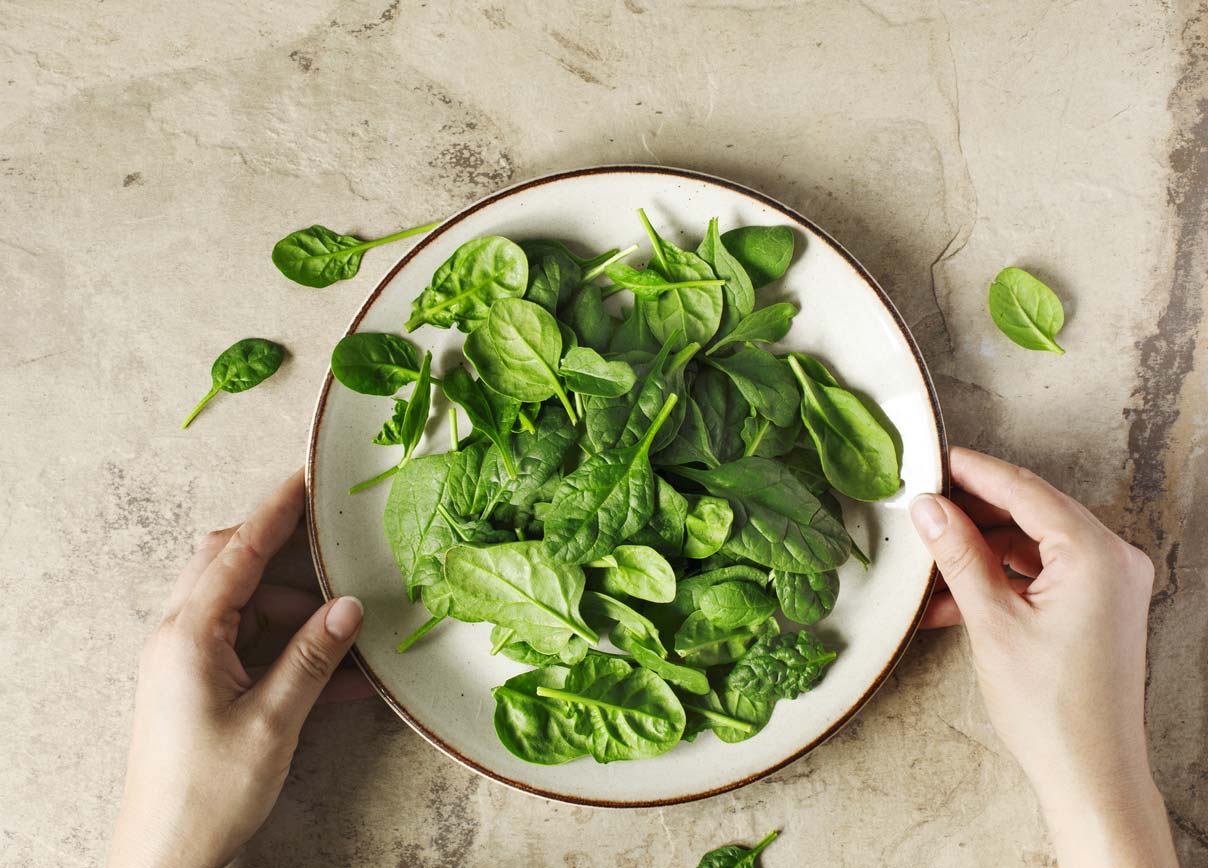
Vitamin K is an essential fat-soluble vitamin that comes in two forms, vitamin K1 and K2. K1 primarily has benefits for blood clotting, while K2 has additional benefits for bone, heart, and brain health, as well as potential cancer prevention. Although the recommended daily intake for vitamin K is only based on vitamin K1, K2 supplementation may be recommended to avoid deficiency, especially for plant-based eaters, since its plant-based sources are limited.
Tell us in the comments:
- What food sources of vitamin K1 and/or K2 do you currently eat? What are some sources of vitamin K2 you could add?
- Have you ever had your vitamin K or osteocalcin levels checked?
- Do you take any supplements containing vitamin K2?
Feature image: iStock.com/Gargonia
